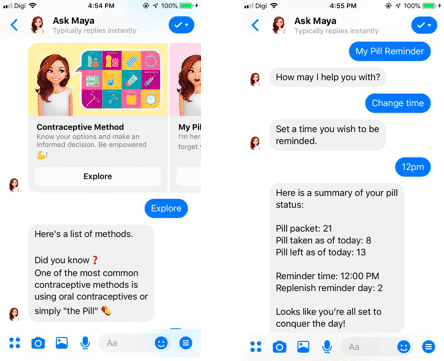Hey there, Kester. Welcome to Marketing In Asia and truth be told, I am excited to know about you and AiChat! So, Kester, walk us a bit on your background and passion for our readers here.
Prior to founding AiChat, I worked with one of the world’s largest advertising networks, the WPP Group, where I had the privilege to lead multiple award-winning digital campaigns for the Fortune 500 clients. I am passionate about emerging technology, AI, entrepreneurship and believe that AI will make people’s lives easier and ultimately contribute to the success of businesses.
We know that you are the Co-Founder and CEO of AiChat and to know your story first-hand is amazing. Out of curiosity, please, tell us more on the journey of how AiChat came about.
We started this journey back in 2015 as a messaging concierge service on Whatsapp. In essence, people texted us their needs, we then scouted the best deals and transacted for them. Traction grew and so when Facebook Messenger opened a bot framework in 2016, we ported over the service to our very own personal shopping bot – Ask Voila. The volume of queries grew and we became affiliate partners for two e-commerce giants: Lazada and Zalora.
Before long, news of Ask Voila and its impact on conversational commerce got the attention of enterprises. We then started building similar virtual agents for clients like Philips Lighting Singapore and Marina Bay Sands. In the process, we also built a platform that allowed non-programming business units to update, amend and train their bots. Eventually, we pivoted to form AiChat with this focus on building enterprise-level chat solutions to hit marketing and sales objectives.
In 2016, a survey conducted by Oracle indicated that 80% of businesses intend to implement chatbots by 2020. And now as we enter a new decade, where are we with chatbots – are they on track to transforming the way brands interact with people?
Without a doubt – we’ve seen a clear impact on our clients’ customer experience, lead generation and sales standards. This ranges from helping brands automate 91% of enquiries, generating 5 times more leads to driving 3 times more lead conversions. Into the new decade, with the emphasis on big data management, strategies around scaling customer experience and chatbot accuracy will be one of the most significant shifts we’ll be seeing more of.
Chatbots will definitely enhance the customer experience. They are now able to detect the emotions and sentiments of the customer they are speaking to; they can respond with a personality that represents the voice of the brand, and the chatbots can escalate an issue to human agents when necessary. With chatbots, it is now also possible to tailor-make the conversational experience for the customer. This advancement in personalization is possible as chatbots can profile and segment customers, to provide them with a more personalized experience in terms of the content to be consumed, and how products are offered to customers.
Chatbots are also smarter: they can understand the context of the inquiries clients make, and can thus provide more accurate results. This is made possible through higher computing power, which allows us to train the A.I. model faster; data availability, through which there are more sources to collect data, allowing us to build up domain-specific knowledge bases and native language packages; and better tools than before to build chatbots, with better interface for business users to build a chatbot without any programming skills, hence speeding up the deployment and roll-out of chatbots.
Let’s talk about AiChat, Kester. AiChat has helped Petron, Mitsubishi Motors, Philips and other top brands manage high volumes of customer requests with accuracy and efficiency since 2016. So, what can we expect from it and how is it different compared to other chatbots?
The chatbots we’ve launched with our clients are varied in their function and scope according to business goals but the common thread across them – they are ever-learning and advancing. The pursuit of accuracy and efficiency takes time but is expedited with our intuitive, enterprise-ready platform to enable business units to provide ample updates, revisions and training.

Hence, what you can look forward to when interacting with our clients’ bots would be user-centric experiences as they continue to grow with user interactions. Beyond addressing queries, our bots are also designed with marketing and sales features, i.e. recommendation engines, profiling surveys, product preference tagging, buying behaviour, etc thus tailoring and personalising chat based on individual interactions.
Today we live in a generation where technology is always evolving. How do you ensure that chatbots continue to help businesses scale their services and manage a growing customer base without affecting quality and service?
Having our own proprietary AI engine is pivotal to such an adaptation as we can flex and scale the algorithm application according to enterprise needs. Beyond that, our platform for bot management has been built to be intuitive for non-programming business units to easily update, manage and train their virtual agents as well as escalating chats to human reps when bot limitations are detected. This collaborative feature prevents bottlenecks of tech requests internally and seamlessly grows the bot’s knowledge base to address increasing levels of query complexities. The scalability of cloud servers and advancements in computing power are also contributing factors.
When A.I. is concerned, the public always have the misconception that they are here to steal human jobs. So, Kester, how can strategic collaboration between humans and A.I. streamline workflow and improve customer service?
Chatbots are meant to empower human agents in service and conversion standards with its ability to execute data communication 24/7 and at scale. This collaboration comes in various levels – from basic query management and handing off of more complex ones to human agents, pre-qualification of customer needs for routing to the relevant departments, facilitating knowledge sharing thru AI-assisted live chat to predicting buyer behaviour and patterns.
However, the human touch and intuition in such communications can never be fully replaced. In fact, we envision that with the collaborative application of chatbots and human agents, new job roles and opportunities will arise such as Conversational Designers, A.I Chatbot Trainer, Linguists etc.
Tell us, Kester, how has marketing, branding and communication impacted the Southeast Asian market since the existence of chatbots and how will it play its role compared to the past?
The positioning of chatbots has been varied across markets and time – moving from novel to hype to now, tried and tested business tool. There are multiple contributing factors to this fragmented image such as market readiness, management buy-in, modern versus traditional infrastructure, short-term solutions and more.
Increasingly though, we are seeing a paradigm shift with enterprises placing chat as an integral part of their digital plans moving forward. Fuelled by the rise of success cases, proven ROI and inevitable increasing volume of chat interactions, these shifts will see chat taking on more complex online experiences as compared to merely answering queries in its initial iterations.
How is AiChat playing its role in amplifying the brands and strategically providing consumers with the engagement that they desire in today’s competitive landscape?
We work very closely with our clients and partners in designing and conceptualising the conversational flow most suited to engage their target consumers. Usually, these come in the form of interactive campaigns to onboard users coupled with appropriate ad buys. Upon launching the bot, we then track and do quarterly reviews with clients on the bot’s performance, engagement metrics and will recommend enhancements if required.
What really helps too, given the team’s DNA in digital marketing, is how our clients’ KPIs to drive and excite us as product owners too. Much research and analysis go into meeting clients’ objectives and we find hitting these milestones and at times surpassing them, have been the best amplifier of our chat solution.
What do you hope to achieve for AiChat in the next couple of years?
Moving forward, we aim to assert our leadership in the enterprise chat space as we expand in the Southeast Asian market. This is backed by a continued commitment to deliver enterprise-ready conversational solutions as well as key milestones like breakthroughs in our machine learning models, feature updates on our platform for scalable implementation and a Southeast Asian language package.
For those who wish to get in touch with you, what is the best way?
Do drop us an email or have a chat with our friendly virtual assistant.
Geogy Ross is a content creator at Marketing In Asia. Connect with her on LinkedIn.















